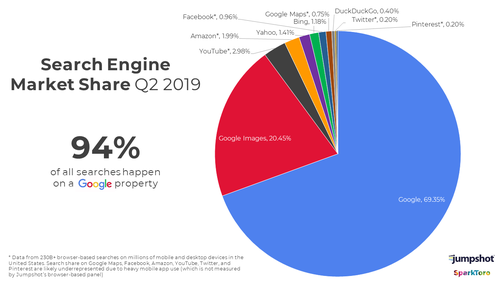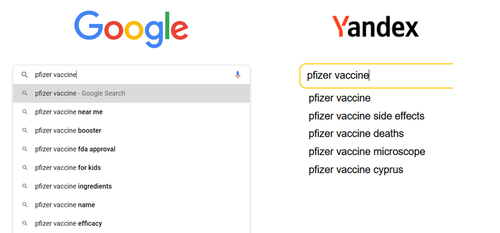How To Escape Google
Do you belong to the 94% of Internet users who have no clue?
Google Search has a US online search market share of about 70%, or even 94% if Google Images, Google Maps and Google-owned YouTube are added (see chart above).
If you belong to these 94%, there is some bad news for you.
As a well-known US podcaster recently discovered, Google is indeed “hiding information” from its users. This has actually been known for many years, but it has become especially obvious and serious during the coronavirus pandemic.
In fact, censorship by Google has become so bad that nowadays, advanced Internet users are using Google primarily to monitor the current extent of censorship, not to actually search for anything. US researcher Dr. Robert Epstein termed it the Search Engine Manipulation Effect (SEME).
Of note, Google censorship affects not just search results, but even search suggestions. In other words, Google is first manipulating what you search for, only to then additionally manipulate what results you will get. It is well worth trying this out yourself to appreciate the effect (see below).
What is Google hiding from you? In short, they are hiding “non-authoritative sources”. In other words, they are hiding stuff those in power don’t want you to know or to even think of.
This is not all that surprising, given that Google initially was a research and startup project funded and supported by US intelligence and the military to “retain information superiority”.
Essentially, Google Search has become an online prison library.
Fortunately, there are a few alternatives to Google Search, although not as many as one might think. In fact, there are currently only two real alternatives to Google Search.
These two alternatives are Microsoft Bing and Russian Yandex.
The fact that Microsoft as a monopolistic corporation and Yandex as a Russian provider are offering more or less uncensored search results is somewhat ironic, and both of them may have their own reasons for doing so. But these are currently the only real alternatives to Google.
What about the many other, independent search engines, though? The truth is, most of them are neither independent, nor even actual search engines, as most of them simply rely on results provided by Google or Bing.
For instance, Startpage is simply providing Google search results.
DuckDuckGo, Yahoo, Qwant, Ecosia, Swisscows, MetaGer and other search engines are primarily relying on Microsoft Bing, although some of them may be adding a few other contextual sources or important privacy features. But with most searches, you will simply get Bing results.
If Microsoft Bing, one day, should decide to apply Google-style censorship (or get forced to do so), sophisticated Western Internet users will either have to rely on Russian Yandex, or will finally have to create an independent, real and uncensored search engine.
Otherwise, the Internet is going to become a pretty dark place, literally.
One more thing: YouTube. YouTube belongs to Google, too (since 2006).
This is why it has become increasingly difficult to find YouTube videos on “controversial topics”. In many cases, what you are looking for may already have been deleted by YouTube, but even if not, it may not be displayed in the highly censored YouTube search results and recommendations.
Instead, one has to use an alternative search engine based on Bing – which is indexing YouTube videos independently – and then search for the topic by adding “site:youtube.com”.
Or, better still, use an alternative video platform from the outset, like Odysee, Bitchute, Rumble, Brighteon, DTube, or even Archive.org.
Independent video producers, too, increasingly have to switch to these alternative platforms, as creating videos on YouTube nowadays is like building a sandcastle too close to the water.
To learn more about online media sources, search engines, ad blockers, bypassing paywalls and censorship, see Advanced Online Media Use: Seven Recommendations.
Google vs. Yandex
Russian Yandex seems to be manipulating search suggestions in the opposite way of Google. For instance, when searching for “Pfizer vaccine”, the first two search suggestions currently are “Pfizer vaccine deaths” and “Pfizer vaccine side effects”. Meanwhile, on Google, “Pfizer vaccine” is being auto-completed to “near me”, “booster”, “FDA approval”, “for kids”, or “efficacy”.
“Pfizer vaccine”: Yandex vs. Google
Google vs. Bing
Coronavirus: a “planned pandemic” (Bing) or “planning tools” (Google)?
Coronavirus: Google vs. Bing
Literature
- The new mind control (Dr. Robert Epstein, Aeon, 2016)
- How the CIA made Google (Nafeez Ahmed, Medium, 2015)
- Google is not what it seems (Julian Assange, Wikileaks, 2014)
- The Military Origins of Facebook (Whitney Webb, Unlimited Hangout, 2021)
- Surveillance Valley: The Secret Military History of the Internet (Yasha Levine, 2018)
Video: Google vs. Bing
A “meme compilation” on differences between Google and Bing. (2019)
https://ift.tt/3DSy9cR
from ZeroHedge News https://ift.tt/3DSy9cR
via IFTTT








0 comments
Post a Comment